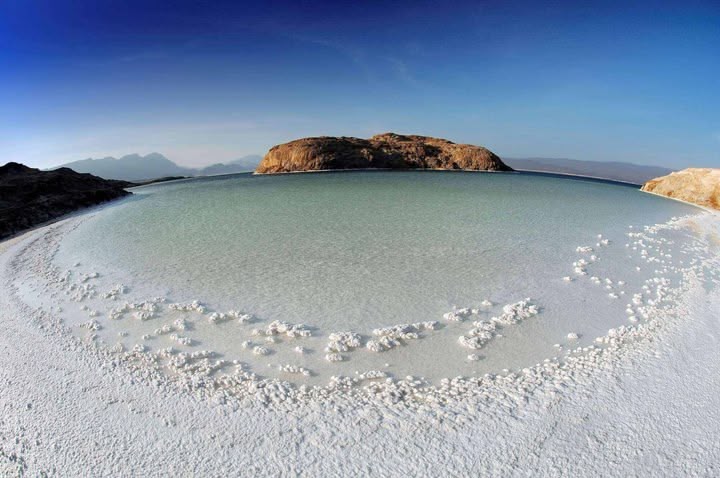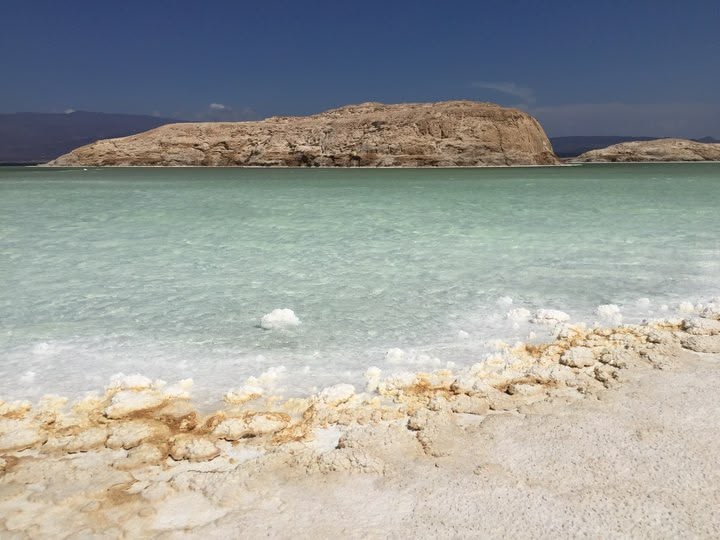Did you know: about Lake Assal?
Lake Assal is a hypersaline lake and the lowest point in Africa, located in the Danakil Desert of Djibouti, in East Africa's Afar Depression. It is a unique geological site within the Great Rift Valley where tectonic plates are drifting apart. The lake is a crater lake, with water so saturated with salt that it is up to 10 times saltier than the ocean. Because it lacks an outlet, and due to high evaporation rates, the lake has formed the world's largest salt reserve and is surrounded by striking white salt crusts. It is a significant site for salt harvesting, a livelihood for the local Afar people.
Geographic and Geological Features
Location:
Situated in the Danakil Desert of central Djibouti.
Lowest Point: At approximately 509 feet (155 meters) below sea level, it is the lowest point in Africa and one of the lowest on Earth.
Tectonic Setting: The lake is located in the Afar Depression, part of the Great Rift Valley, where three continents are slowly drifting apart.
Crater Lake: It is a shallow, endorheic (lacking an outlet) crater lake.
Salt and Water Characteristics
Hypersaline: The water is extremely salty due to seawater input, high evaporation, and tectonic activity.
Salt Reserve: Lake Assal contains the world's largest salt reserve, which local communities harvest.
Mineral Content: The salt is composed of various minerals, including gypsum and halite, and the water is also rich in beneficial minerals like magnesium and calcium, which are good for the skin.
Cultural and Economic Significance
Salt Trade: The salt harvested from Lake Assal has been a central part of the local economy and trade routes for centuries.
Afar People: The indigenous Afar people rely on salt harvesting as their primary source of income.
Tourism: The unique and harsh landscape around the lake, with its black lava fields and white salt banks, attracts tourists and geological enthusiasts.
Wellness Potential: The mineral-rich water has potential therapeutic benefits, leading to proposals for developing wellness resorts.
Geographic and Geological Features
Location:
Situated in the Danakil Desert of central Djibouti.
Lowest Point: At approximately 509 feet (155 meters) below sea level, it is the lowest point in Africa and one of the lowest on Earth.
Tectonic Setting: The lake is located in the Afar Depression, part of the Great Rift Valley, where three continents are slowly drifting apart.
Crater Lake: It is a shallow, endorheic (lacking an outlet) crater lake.
Salt and Water Characteristics
Hypersaline: The water is extremely salty due to seawater input, high evaporation, and tectonic activity.
Salt Reserve: Lake Assal contains the world's largest salt reserve, which local communities harvest.
Mineral Content: The salt is composed of various minerals, including gypsum and halite, and the water is also rich in beneficial minerals like magnesium and calcium, which are good for the skin.
Cultural and Economic Significance
Salt Trade: The salt harvested from Lake Assal has been a central part of the local economy and trade routes for centuries.
Afar People: The indigenous Afar people rely on salt harvesting as their primary source of income.
Tourism: The unique and harsh landscape around the lake, with its black lava fields and white salt banks, attracts tourists and geological enthusiasts.
Wellness Potential: The mineral-rich water has potential therapeutic benefits, leading to proposals for developing wellness resorts.














